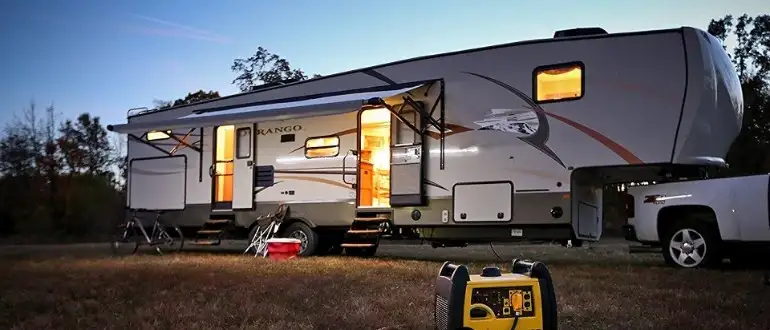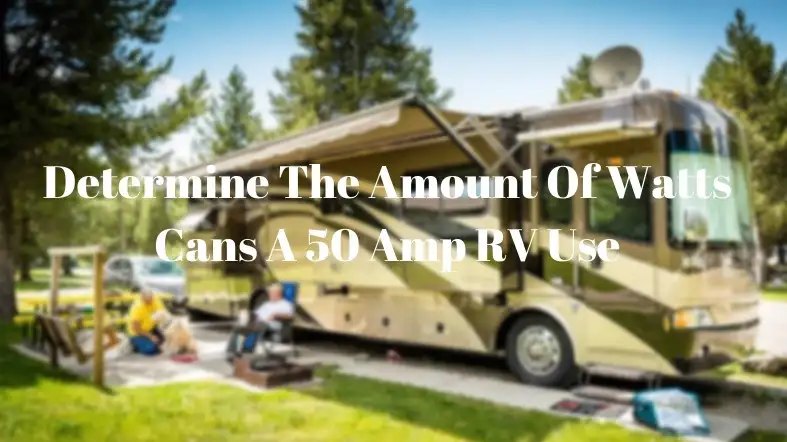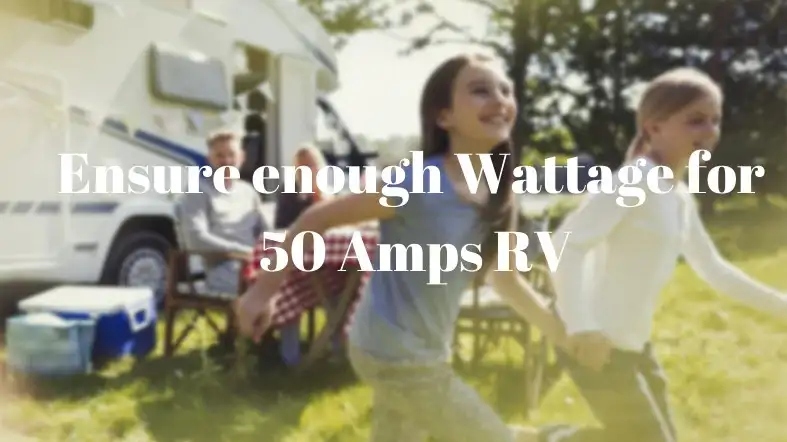Are you in the market for a generator for your 50 amp RV? Choosing the right size generator for your needs can be a daunting task, but don’t worry.
In this blog post, we’ll discuss the different size generators available and which one is best suited for powering your RV.
We’ll also provide tips on how to select the best generator and how to use it safely.
Click Here To Check Recommended Generators
What Size Generator For 50 Amp RV?
For a 50 Amp RV, you would typically need a generator that can produce between 6,000 to 8,000 watts to power most appliances and devices comfortably, though a 50 Amp RV can technically handle up to 12,000 watts.
Below is a table that lists some popular models and their features suitable for 50 Amp RVs.
| Type | Rated Power | Peak Power | Fuel Type | Run Time | Noise Level | Price |
| Portable Generator | 12,000 W | 15,000 W | Gasoline/Propane | 16 hours (gasoline) / 11 hours (propane) at 50% load | 74 dB | $2,599 |
| Portable Generator | 12,000 W | 15,000 W | Gasoline | 9 hours at 50% load | 78 dB | $2,199 |
| Portable Generator | 15,000 W | 22,500 W | Gasoline | 10 hours at 50% load | 74 dB | $3,099 |
| Inverter Generator | 5,500 W | 7,000 W | Gasoline | 18 hours at 25% load | 52 dB – 60 dB (eco mode) | $4,499 |
| Dual Fuel Generator (Portable/Inverter) | 9,500 W (gasoline) / 8,550 W (propane) | 12,000 W (gasoline) / 10,200 W (propane) | Gasoline/Propane | 8.83 hours (gasoline) / 7.2 hours (propane) at half load | 72 dB | $1,299 |
Types of Generators Suitable for 50 Amp RV
The following types of generators are suitable for 50 Amp RVs.

Portable Generators
Portable generators are the most common type of generators used by RVers.
They are powered by gasoline or propane and can produce a lot of power for a relatively low cost. They are also easy to move around and store when not in use.
Inverter Generators
Inverter generators are a newer type of generators that are more efficient and quieter than portable generators.
They use advanced technology to convert DC power into AC power with minimal loss of energy.
They also have a smart throttle that adjusts the engine speed according to the load demand.
Inverter generators are ideal for sensitive electronics such as laptops and TVs because they produce clean and stable power with fewer fluctuations and distortions.
Standby Generators
Standby generators are permanent generators that are installed outside your RV and connected to your electrical system.
They are powered by natural gas or propane and can automatically turn on when there is a power outage or when you need extra power.
Standby generators are great for long-term use and peace of mind because they provide reliable and continuous power without any hassle or interruption.
They also have higher power output and longer run times than portable or inverter generators.
Solar Generators
Solar generators are eco-friendly generators that use solar panels to capture the sun’s energy and store it in batteries.
They can provide clean and renewable power for your RV without any noise or emissions.
Solar generators are perfect for RVers who want to reduce their carbon footprint and save money on fuel costs.

Essential Features to Consider When Choosing a Generator for 50 Amp RV
Here are some essential features that you should consider when choosing a generator for your 50 Amp RV:
Power Output
To find out how much power you need for your RV, you can use this simple formula:
Total Power Needed (Watts) = Total Power Used by Appliances (Watts) + 20% Margin
For example, if you have an air conditioner that uses 3,000 watts, a microwave that uses 1,000 watts, a refrigerator that uses 600 watts, a TV that uses 200 watts, and some lights that use 100 watts, then your total power used by appliances is:
3,000 + 1,000 + 600 + 200 + 100 = 4,900 watts
To add a 20% margin for safety and flexibility, you multiply this number by 1.2:
4,900 x 1.2 = 5,880 watts
This means that you need a generator that can produce at least 5,880 watts of rated power to run all these appliances and devices in your RV.
Fuel Efficiency
To find out how fuel-efficient a generator is, you can look at its run time.
Run time is the amount of time that a generator can run on a full tank of fuel or battery charge at a certain load level.
Load level is the percentage of power output that the generator is using compared to its maximum capacity.
For example, if a generator has a run time of 10 hours at 50% load, this means that it can run for 10 hours when it is producing half of its maximum power output.
If it has a run time of 5 hours at 100% load, this means that it can run for 5 hours when it is producing its maximum power output.
Noise Level
To find out how noisy a generator is, you can look at its noise level. Noise level is the amount of sound that a generator produces, measured in decibels (dB).
The higher the decibel number, the louder the sound.
For example, a normal conversation is about 60 dB, a vacuum cleaner is about 70 dB, and a rock concert is about 110 dB. You should look for a generator that has a low noise level, preferably below 70 dB.
The noise level of some generators can be reduced with features like mufflers, sound insulation, or eco mode.
To make your generator quieter, you can place it away from your RV or on a soft surface, use a generator enclosure, or add sound-absorbing materials around it.
Portability and Size
To find out how portable and compact a generator is, you can look at its weight and dimensions.
Weight is the amount of mass that a generator has, measured in pounds (lbs) or kilograms (kg).
Dimensions are the measurements of the length, width, and height of a generator, measured in inches (in) or centimeters (cm).
For example, a generator may weigh 200 lbs and have dimensions of 30 x 20 x 25 in. You should look for a generator that has a low weight and small dimensions, as this will make it easier to move and store.
Wheels, handles, foldable handles, or collapsible handles can make your generator more portable and compact.
You can also use carts, dollies, or cases to make your generator more portable and compact.
Price and Warranty
To find out how much a generator costs and what warranty it offers, you can look at its price and warranty.
A generator’s price is measured in dollars ($) or other currencies. A warranty states how long and under what conditions a generator will be repaired or replaced.
For example, a generator may cost $2,000 and come with a 3-year warranty.
You should look for a generator that has a reasonable price and a long warranty, as this will save you money and give you peace of mind.
Depending on the generator, you may be able to lower the price or extend the warranty.
The best way to save money is to compare prices, look for coupons or rebates, or buy used or refurbished generators.
Run Time
To find out how long a generator can run on a full tank of fuel or battery charge at a certain load level, you can look at its run time.
Run time is the amount of time that a generator can run on a full tank of fuel or battery charge at a certain load level.
Load level is the percentage of power output that the generator is using compared to its maximum capacity.
For example, if a generator has a run time of 10 hours at 50% load, this means that it can run for 10 hours when it is producing half of its maximum power output.
It can run for 5 hours at 100% load, which means it can run for 5 hours at maximum power.
You should look for a generator that has a long run time at different load levels, especially at higher loads.
This will give you more flexibility and convenience when using your generator with your RV.
Parallel Capabilities
To find out if a generator has parallel capabilities and how to use them, you can look at its parallel capabilities.
Parallel capabilities are the ability and the method of connecting two or more generators together to produce more power.
Some generators have built-in parallel capabilities, while others require special kits or cords to enable them.
For example, a generator may have parallel capabilities that allow you to connect it to another identical generator using a parallel kit.
This will double the power output of the generator, allowing you to run more appliances and devices in your RV.
Your RV generator should be parallel-capable and compatible with other generators you may have or want to buy. This will give you more options and versatility.

How to Calculate the Right Size Generator for 50 Amp RV
Here are some steps that you can follow to do this:
Step 1
Make a list of all the appliances and devices that you want to run in your RV, and find out how many watts they use.
You can do this by looking at their labels or manuals, or by using a wattage calculator.
Step 2
Add up the wattage of all the appliances and devices that you want to run at the same time. This is your total power demand.
Step 3
Multiply your total power demand by 1.2 to add a 20% margin for safety and flexibility. This is your total power requirement.
Step 4
Find a generator that can produce at least your total power requirement in rated power.
You can use the table above or do your own research to compare different generators and their features.
Step 5
Check if the generator has enough outlets and the right voltage for your RV. You may need to use adapters or converters to connect your RV to the generator.
Step 6
Test the generator with your RV before using it on a trip. Make sure that it works properly and safely, and that it can handle the load of your appliances and devices.
>> What size generator to run a 2000 square foot house?
Practical Tips for Operating Generator with 50 Amp RV
Here are some practical tips that you can use to operate your generator with your 50 Amp RV:
Regular Maintenance:
Keep your generator in good condition by following the manufacturer’s instructions on how to clean, service, and store it.
Check the oil, fuel, air filter, spark plug, and battery regularly, and replace them when needed.
Proper Ventilation:
Place your generator in a well-ventilated area away from your RV or any flammable materials.
Use a long extension cord to connect your RV to the generator, and avoid running it indoors or in enclosed spaces.
Install a carbon monoxide detector in your RV and monitor it frequently.
Fuel Storage:
Store your fuel in approved containers and keep them away from heat or sparks. Use fresh fuel and avoid using old or contaminated fuel.
Drain the fuel tank and carburetor when not using the generator for a long time.
Monitoring Power Usage:
Monitor how much power you are using in your RV and adjust accordingly.
Turn off or unplug any appliances or devices that you are not using, and avoid overloading the generator.
Use an energy meter or a wattage calculator to keep track of your power usage.
Parallel Capabilities:
Use parallel capabilities if you need more power than one generator can provide.
Connect two or more compatible generators together using parallel kits or cords, and make sure that they are balanced and synchronized.
Best Generator For 50 Amp RV
1. DuroMax XP4000S Portable Generator-4000 Watt Gas Powered Camping & RV Ready
- Plenty of Power – With 4,000 peak watts and 3,300 running watts, this unit can handle heavy loads, from lights and a refrigerator to a home air conditioner and high amperage power tools
- Powerful Engine – The DuroMax 208cc OHV engine is a workhorse that provides plenty of power to handle multiple jobs, from powering high voltage appliances to heavy duty power tools
- Low Oil Shutoff – Protects your investment by automatically shutting the generator off when it senses that the oil is low
- Power Panel – The power panel includes a selection of outlets for maximum compatibility in your applications including: (2) 120V household outlets and (1) 120V 30A twist lock outlet. The panel also includes a voltmeter for measuring voltage output
- Complies with Emissions Standards – All DuroMax generators are both approved by the EPA (Environmental Protection Agency) and CARB (California Air Resources Board) and follow strict guidelines to ensure our generators are as environmentally friendly as possible
2. Westinghouse 6000 Rated & 7500 Peak Watts Portable Generator
- 6000 Running Watts and 7500 Peak Watts; Electric and Recoil Start; Up to 13 Hours of Run Time on a 6. 6 Gallon Fuel Tank With Fuel Gauge
- Features Two GFCI (Ground Fault Circuit Interrupter) 5–20R 120V Household Duplex Receptacle and One Transfer Switch Ready L14-30R 120/240V Twist-Lock Receptacle; All Outlets Have Rubber Covers for Added Safety
- Plug-and-Play! Comes With Oil, an Oil Funnel, a Tool Kit, and a User’s Manual to Get You Started Right Out of the Box (Minimal Assembly Required). RV Ready : No
- Powered by a 420cc Westinghouse 4-Stroke OHV Engine Featuring a Long-Lasting Cast Iron Sleeve With Automatic Low Oil Shutdown and Digital Hour Meter
3. Champion 8000-Watt Dual Fuel Portable Generator with Electric Start
- Dual Fuel – Operate your 8000-watt portable generator right out of the box on either gasoline or propane, plus the unit holds 1.2-quarts of oil (included) and has a low oil shut-off sensor
- Electric start – Power up the 459cc Champion engine with the handy toggle switch, battery included
- Intelligauge – Keep track of voltage, hertz and run-time hours to easily monitor power output and track maintenance intervals
- Powerful – At 10,000 starting watts and 8000 running watts on gasoline and 9025 starting watts and 7250 running watts on propane, trust Volt Guard built-in surge protector to prevent overloads
- Champion Support – Includes 3-year limited warranty with FREE lifetime technical support from dedicated experts
4. Pulsar Heavy Duty 9500 Rated Watts & 12000 Peak Watts Portable Dual Fuel Generator
- 12, 000 peak watts/ 9, 500 Rated watts (gasoline) & 10, 800 peak watts/ 8, 550 Rated watts (LPG)
- Dual fuel capability allows you to choose between gasoline & LPG fuel sources; great for emergency situations or natural disaster as LPG may be more readily available and easy to store
- The 457cc, single cylinder, 4-stroke, air cooled, OHV engine with electric start is protected by a durable powder coated frame
- A 8 gallon fuel tank gives you up to 12 hours of continuous operation at half load when running on gasoline
- (4) 120V 20A AC outlets, (1) 120V/240V 30A twist-lock outlet, (1) 120V/240V 50A outlet, (1) 12V DC output provide ample space for powering appliances, tools, and other devices
- Convenient drop-down handles and 10” never-flat wheels for added mobility and easy storage
- Complete with low oil shut-off, 3-in-1 digital meter, and automatic voltage Regulation for less worry and hassle
- Includes propane hose & backed by a 1 Year limited
FAQs about What Size Generator For 50 Amp RV
How many watts require for a 50 amp RV generator?
The 50 amp RV includes two 120bolts hot wires and it is 12000 watts.
Is it possible a run a 50 amp RV on a 30 amp generator?
Of course. You can easily plug a 50-amp RV cord into the 30-amp generator using an adapter.
How to determine the size of the generator for a certain RV?
Simply multiply the number of volts with the number of amps and the result will be the maximum amount of wattage required for the certain RV.
Will A 7500 Watt Generator Run A 50 Amp RV?
Yes, a 7500 watt generator can run a 50 amp RV.
Will A Predator 3500 Run A 50 Amp Camper?
Yes, the Predator 3500 can run a 50 amp camper.
Is A 50 Amp RV Plug 110 Or 220?
The 50 amp RV plug is a 220 volt plug.
Final words
The power needs of the certain appliances you are going to run determine the size of the generator for 50 amps RV.
So before learning what size generator for 50 amps RV, determine the number of appliances you will run most of the time and their power requirement.
While choosing the best size generator for 50 amps RV doesn’t avoid its specification like the ease of use and weight, noise levels for a convenient experience.





